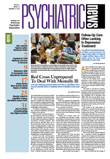Two-thirds of pregnant women with major depression are not receiving treatment, and others with milder depression or at risk for depression lack adequate care, according to a report from researchers at the University of Michigan Depression Center.
The report appeared in the July-August General Hospital Psychiatry.
Using DSM-IV criteria, Heather Flynn, Ph.D., and Sheila Marcus, M.D., interviewed 276 women identified through standard depression questionnaires as being at high risk for depression among 1,837 women in waiting rooms of five obstetrics clinics.
Of the 276 women, 17 percent had major depression, and 23 percent had a history of intermittent major depression needing monitoring and treatment. Only 20 percent of the entire group were receiving treatment. Moreover, of the women who had major depression, only 33 percent were receiving treatment.
The researchers further found that only 43 percent of the women taking medication alone or in combination with talk therapy had been taking antidepressant medication at the recommended dose for at least six weeks.
Flynn, who led the study, called the findings troubling. “These are women who meet the formal clinical criteria for the most severe form of depression. No one would argue that these women would benefit from some form of intervention, but only 33 percent of them were,” she said.
While she conceded that it may not be feasible to monitor closely every pregnant woman at risk in the way this study did, she said it certainly makes sense to ensure that women with depression get the help they need.
No significant depression or depression-treatment differences were found among pregnant women of different races and ethnicities, employment situations, education levels, and marital or parental situations. The only factors found to increase a woman's chance of getting treatment were severe symptoms at the time of the study, a history of major depression, and a history of psychiatric treatment. Flynn said this suggests that women already accustomed to accessing the mental health system may be most likely to do so if they experience depressive symptoms during pregnancy, while other women may not recognize their symptoms or may not know, or believe, that they can get help from a mental health clinician.
Flynn said she sees this phenomenon in her own work. “A lot of the women I see don't really appreciate that the way they've been feeling isn't normal, particularly during pregnancy,” she said. “They attribute their fatigue, sleep, and other problems to pregnancy or don't believe that they could be suffering from depression. Others may suspect a problem but don't believe that treatment can work. But it can.”
Another major barrier to depression treatment may be lack of awareness among doctors treating pregnant women, but such awareness has increased in recent years, noted Flynn. Still, many women are never screened for depression or treated to prevent a recurrence of past depression.
More information on depression during pregnancy, is posted at<www.med.umich.edu/depression/pregnancy.htm>.“ Rates and Predictors of Depression Treatment Among Pregnant Women in Hospital-Affiliated Obstetrics Practices” can be accessed at<www.sciencedirect.com> by clicking on “G,” “General Hospital Psychiatry,”“ Volume 28, Issue 4,” and the title of the article.▪
